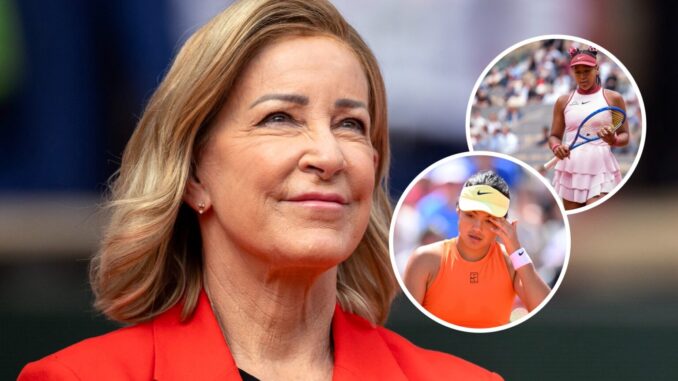
The 2025 French Open has once again showcased the relentless demands of professional tennis, with the red clay of Roland Garros exposing both triumphs and vulnerabilities. Among those facing setbacks were Emma Raducanu and Naomi Osaka, two Grand Slam champions whose early exits in Paris sparked concern and conversation. Tennis legend Chris Evert, a seven-time French Open champion, offered a poignant analysis of the challenges both players face, pointing to a shared struggle rooted in the overwhelming aftermath of their breakthrough victories. As Raducanu and Osaka navigate their careers, Evert’s insights shed light on the pressures of fame, expectations, and the long road to reclaiming elite form.
Emma Raducanu, the 22-year-old British star, captivated the tennis world in 2021 when she won the US Open as a qualifier, a feat Evert describes as unprecedented: “We will never see a qualifier come through and do what she did again.” However, her second-round loss to Iga Swiatek at the 2025 French Open, following a first-round defeat for Osaka to Paula Badosa, highlighted ongoing challenges. Evert, speaking as a TNT Sports analyst, expressed sympathy for both players, noting, “I just feel she has lost so many years of her career because of the whole thing around the one big win. It’s the same with Naomi.” For Raducanu, the whirlwind of fame, endorsements, and coaching changes has disrupted her progress, while Osaka’s battles with mental health and her 2023 maternity break have slowed her return to dominance.
Raducanu’s 2025 season has shown flashes of brilliance. Since partnering with coach Mark Petchey in Miami, she has climbed the rankings, reaching the quarter-finals in Miami with wins over Emma Navarro and Amanda Anisimova and pushing top players like Marta Kostyuk and Coco Gauff to competitive matches in Madrid and Rome. Yet, her 6-2, 6-4 loss to Swiatek in Paris underscored her struggle to consistently challenge the sport’s elite. Evert observed, “She’s not there yet. She’s got to build, go back to the drawing board and build up slowly.” Raducanu’s youth and sound technique—praised for her serve, groundstrokes, and movement—offer hope, but Evert questioned her hunger: “She’s got talent, but how much does she want it? Is she chomping at the bit?”
Osaka’s journey mirrors Raducanu’s in some ways but carries its own complexities. The 26-year-old Japanese star, a four-time Grand Slam champion, returned to the tour in 2024 after giving birth to her daughter. Her 2025 season has been inconsistent, with a 18-15 record and no tournament runs beyond the quarter-finals. Her first-round exit in Paris marked another setback, prompting Evert to reflect on her mental state. “She’s going through some doubtful times,” Evert noted, suggesting that Osaka’s newfound contentment as a mother might temper the fierce intensity needed for top-level competition. “Sometimes when you are too happy, that can’t always be good either, for us to be intense and fierce,” she added, contrasting Osaka’s current demeanor with her commanding 2018 and 2020 US Open victories.
Both players have faced unique pressures since their breakout moments. For Raducanu, the “beautiful girl” label, as Evert put it, amplified her marketability, leading to a flood of endorsements that may have distracted from her development. “The endorsements came in, the coaches were coming in and out, and still her expectations are right up there now,” Evert said. Osaka, meanwhile, has been open about her mental health struggles since 2021, when she withdrew from the French Open after opting out of press conferences. Her pregnancy and motherhood have brought joy but also shifted her focus, with Evert suggesting that her daughter is now “more important than anything else in the world.”
Despite their challenges, Evert remains optimistic about their futures. For Raducanu, she believes a “solid commitment” could propel her back to the top 10, citing her 2021 US Open run where she didn’t face top-10 players, unlike finalist Leylah Fernandez, who defeated three top-five opponents. “If Leylah had won, her life may have changed forever, but Emma is the one who had to live through that experience,” Evert remarked. For Osaka, Evert sees potential for a resurgence, particularly at the US Open, where she’s won twice before. “She has won this title, so let’s see if she can get that magic going,” Evert said, acknowledging the emotional weight of her journey.
As Raducanu prepares for the grass-court season and Osaka looks to regroup, both must navigate the delicate balance of rebuilding their games while managing external pressures. Evert’s analysis underscores a universal truth in tennis: a single big win can redefine a career, but sustaining success requires resilience, focus, and time. For these two young champions, the path forward involves not just technical improvements but also rediscovering the fire that fueled their historic triumphs. With the tennis world watching, their stories remain unfinished, filled with potential for redemption and renewed glory.
Leave a Reply